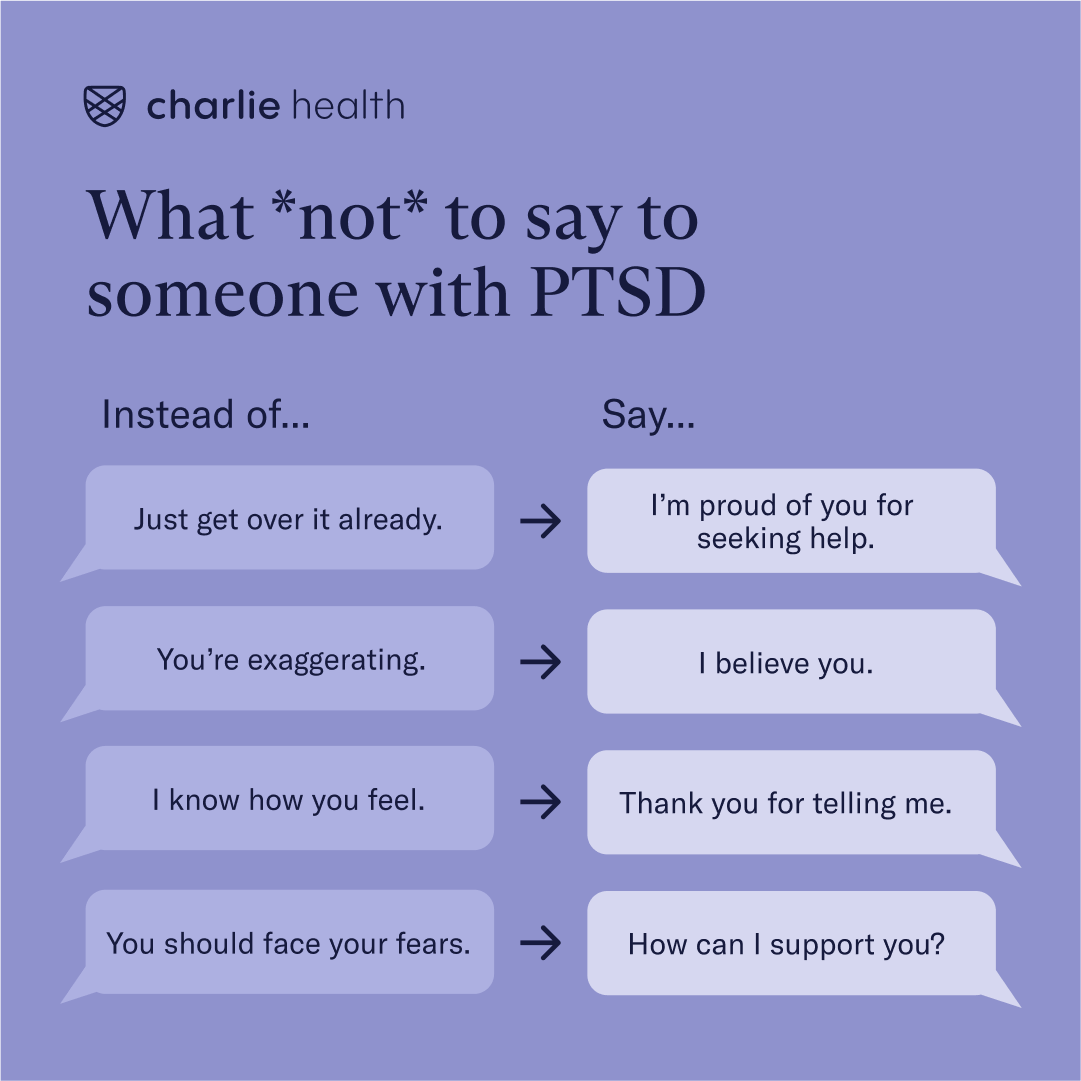
Table of Contents
Here’s What Not to Say to Someone With PTSD
Written By: Charlie Health Editorial Team

Clinically Reviewed By: Dr. Don Gasparini
February 14, 2024
4 min.
Five common phrases to avoid when talking to someone with PTSD.
Learn more about our Clinical Review Process
Table of Contents
When a loved one is struggling with post-traumatic stress disorder (PTSD), it can be hard to know what to say. Saying the wrong thing might make them feel more isolated, so it is important to be patient and show them that they are not alone.
An understanding of PTSD is essential in providing support to someone experiencing this mental health condition. In short, doing your research is the first step in offering support. Below, we will explore five common phrases that can be harmful to say to someone with PTSD, plus some guidance on what you can say that may actually help.

We’re here to help your loved one
Trauma-informed mental healthcare without a waiting list.
5 things not to say to someone with PTSD
It can be challenging to know how to support a loved one with PTSD, let alone what not to say to them. However, identifying common phrases that can be harmful to hear for someone with PTSD can help you better understand how to support your loved one. Below, we will explore five things you should not say to someone dealing with PTSD.
1. “Just get over it already.”
Telling someone with PTSD to “just get over it already” is hurtful because it ignores their experience and oversimplifies their recovery. This statement suggests that they should be able to overcome their struggles easily, which is not the case with trauma.
Also, telling someone to “just get over it already” adds to the stigma surrounding seeking support for PTSD and may hinder your loved one’s recovery journey. Instead, offering empathy and understanding is important, and you should encourage them to seek professional help if needed.
2. “You’re exaggerating.”
Telling someone with PTSD, “you’re exaggerating,” dismisses their experiences and feelings. PTSD is a serious mental health condition resulting from trauma, and people with PTSD often experience intense distress and symptoms that significantly impact their lives.
By saying they are exaggerating, you invalidate their struggles and may make them feel unheard or misunderstood. Even if you may not fully understand their experiences, offering support rather than dismissing their feelings is crucial.
3. “I know how you feel.”
Telling someone with PTSD, “I know exactly how you feel,” can be unhelpful and even invalidating. Each person’s experience with trauma and PTSD is unique. Even if you have experienced the exact same traumatic event and been diagnosed with PTSD yourself, it’s unlikely that you understand exactly how they feel, since PTSD symptoms affect everyone differently.
Also, by claiming to know how they feel, you may unintentionally minimize their experiences and the traumatic events that have affected them. Instead, it’s more supportive to acknowledge that you can’t fully understand their experience but that you’re there to listen and support them in any way you can.

4. “You should face your fears.”
Telling someone with PTSD, “you should face your fears,” can be counterproductive. PTSD involves experiencing intense fear, anxiety, and distress in response to traumatic events. Encouraging someone to face their fears without proper support and guidance can lead to overwhelming distress and may potentially worsen their mental health and physical symptoms.
Recovery from PTSD often requires a gradual and carefully managed approach, with the guidance of a mental health professional or trauma therapist. You should offer empathy, understanding, and support to someone with PTSD rather than pressuring them to confront their fears before they are ready.
5. “Why didn’t you say something earlier?”
Asking someone with PTSD why they didn’t share their diagnosis or trauma with you earlier can be insensitive and potentially retraumatizing. People with PTSD may have valid reasons for not disclosing their traumatic experience, such as fear of judgment, shame, and overwhelming physical symptoms.
Questioning people’s actions may trigger intense emotions and memories. You should respect their boundaries and decisions regarding when and how they disclose their experiences. Instead of asking why they didn’t speak up, offering a safe and non-judgmental space to share if and when they feel ready is more supportive.

How to help a loved one with PTSD
Instead of using the above statements, try to provide support when talking to someone with PTSD. Here are some phrases that may help you communicate more effectively with someone with PTSD:
- “I believe you.”
- “I’m proud of you for seeking help.”
- “You’re not alone.”
- “Thank you for telling me.”
- “How can I support you?”
Research shows that early diagnosis and intervention are essential in the treatment of PTSD. It is important to help your loved one connect with necessary mental health resources available to those who have experienced PTSD. Treatment options for PTSD include group sessions, talk therapy, cognitive behavioral therapy, exposure therapy, and more. However, if your loved one is not ready to seek professional treatment, it is important to offer social support and meet them where they are in their healing journey.

PTSD treatment at Charlie Health
If you or a loved one are struggling with post-traumatic stress disorder, Charlie Health is a treatment option that may help. Charlie Health’s virtual Intensive Outpatient Program (IOP) provides more than once-weekly mental health treatment for dealing with complex mental health conditions, including PTSD. Our expert clinicians incorporate evidence-based therapies into individual counseling, family therapy, and group sessions. With treatment, managing PTSD is possible. Fill out the form below or give us a call to start healing today.




